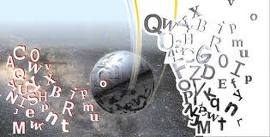.
Perhaps one of your new year’s resolutions is to migliorare (improve) in italiano. As a way to expand and improve your vocabulary of Italian words, I thought it might be useful and interesting to share some of the new Italian words that have come up in recent conversations with my students.
.
Do you have any secrets for committing new words to memory? Many of my students use flashcards that they make using index cards. This is an excellent method for increasing your vocabulary, especially because they’re easy to take anywhere and to review in those little ‘dead’ spaces of time (waiting in line, or for the bus, the microwave, the doctor, the kids, or the light to turn green, etc, etc, etc).
.
.
I read recently that researchers have found that it’s necessary to repeat a new word 160 times before it becomes lodged in your memory and part of your ‘repertoire’. Wow. 160 does sound like a lot of times. But, since many experts of psychology tell us that our inner dialog mostly consists of the same thoughts over and over (many of them supposedly not so positive), why not mix it up and repeat some new words over and over? It sure would be a more productive use of our tendency towards being mentally repetitive!
.
At the end of the blog, please let me know if you’ve found this useful. And, of course, please share any new Italian words that you’ve come across recently!
.
Listen & Practice Your Pronunciation:
- Originariamente = (adverb) originally, initially. E.g., Originariamente il vestito di Babbo Natale era verde, non rosso come siamo abituati a vederlo. (Originally, Santa Claus’ suit was green, not red as we are used to seeing it.) Note: ‘Originalmente’ is not an Italian word.
- Avere senso = (verb phrase) to make sense (lit. to ‘have sense’). E.g., Questa storia non ha senso. (This story doesn’t make sense.)
- Avere ragione = (verb phrase) to be right (lit. to ‘have reason’). E.g., Elena ha ragione e Luigi ha torto. (Elena is right and Luigi is wrong.)
- Avere torto = (verb phrase) to be wrong/ in the wrong/ mistaken; see example for #3.
- Acciacco = (noun) infirmity, ailment, complaint, ache, pain. E.g., ‘gli acciacchi della vecchiaia’ (the infirmities of old age); ‘essere pieno di acciacchi’ (to be full of aches and pains.)
- Nemmeno = (adverb) not even. E.g., Non l’ho nemmeno visto. (I didn’t even see him.) (Conjunction) not… either, neither, nor. E.g., Tu non lo vuoi? Nemmeno io.’ (You don’t want it? Neither/Nor do I. Or, I don’t either).
- Ogni altra volta, Ogni altro giorno/ mese/ anno, ecc = (adverbial phrase) Every other time, every other day/ month/ year, etc. E.g., Il mio proposito quest’anno è di andare in palestra ogni altro giorno. (My intention/goal/resolution this year is to go to the gym every other day.)
- Gioioso = (adjective) joyous. E.g., Vi auguro un gioioso anno nuovo. (I wish you a joyous new year).
- Proposito = (noun) goal, aim, intention; see example for #7.
- Propositi per l’anno nuovo = new year’s resolutions, E.g., Quali sono i vostri propositi per l’anno nuovo? (What are your new year’s resolutions?). If you’d like, please write about them below, in Italian or in English. The comments section is below the sign-up form.
.
Auguri a tutti per un fantastico 2011 pieno di propositi realizzati! (Best wishes to all for a fantastic 2011, full of accomplished resolutions!)
.





Ciao, Jodina! Ogni giorno leggo pagine d’italiano, practicare la lingua in e-mails con amici, e – molto importante per ricordare – canzoni! Per esempio – canzoni come “Se” di Josh Groban http://www.youtube.com/watch?v=jdYbOxyv_mk (ma che bellissimo – da “Cinema Paradiso”) mi aiuta MOLTO per capire “congiuntivo.” Si, la ricerca e` giusto – and here I thought I was just slow because it would take sometimes multiple usages to remember a word – nemmeno being one of them. The key is also to immerse and finally use (and mess them up) in context, I believe. Enjoy Il Postino! Massimo Troisi was so fantastic – I’m finishing up Non Ci Resta Che Piangere con Roberto Benigni (love him too).
Brava Valeria!
e` vero, bisogna continuare a esercitare la lingua per non perderla..
Suggeriro` la canzone “Se” ai miei studenti che stanno studiando il congiuntivo…. che continuo ripetere a loro non e` una naughty word! 😉
And you’re right, it DOES take time and repetition. People can be too hard on themselves. My advice: enjoy the ride! Just think of how many people are talking about studying a language… and here you are actually doing it!
I heart Roberto B, too!
Un abbraccio.